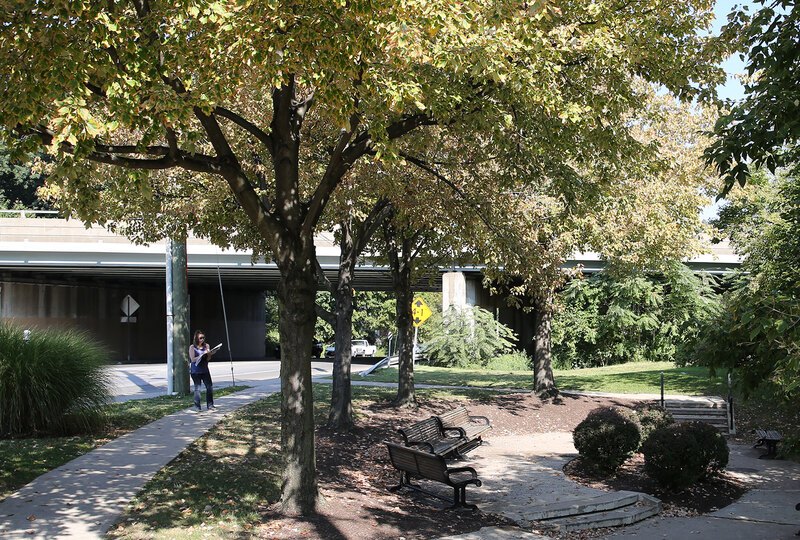First Deb Mitchell Research Grant Awarded

The Landscape Architecture Foundation (LAF) is delighted to announce the first recipient of our new $25,000 research grant.
The LAF Research Grant in Honor of Deb Mitchell is awarded annually to support a research project that is relevant and impactful for the professional practice of landscape architecture.
The winning proposal, Greenscapes to Brownscapes: A Study on Impacts to Contaminant Levels in Landscapes Adjacent to Highways, will look at deposition and accumulation of traffic-related air pollutants in landscapes along the I-95 corridor in Philadelphia. Working with a diverse advisory group, principal investigators Allison Harvey and Andy Adams will construct in situ test plots and collect data over a 40-week period, monitoring air quality and conducting soil and swab testing for heavy metals and polycyclic aromatic hydrocarbons.
The pilot study will add to the limited existing research on rates of deposition in urban parks over time to increase understanding of how a new site accumulates contaminants. The data, findings, and dissemination will augment the resources available to landscape architects to achieve more sensitive and healthful design responses. The findings could also inform programmatic recommendations and maintenance schedules to assist in minimizing exposures to secondary air pollution sources in existing and new landscapes near highways.
“With an impressively broad group of stakeholders and partners, this proposal represents the type of interdisciplinary collaboration we were trying to foster with this grant opportunity,” said Michael Johnson, a member of the LAF Board of Directors and Research Committee and Principal/Urban Design Practice Co-Director at SmithGroup, which augmented the generous bequest from Debra Mitchell, FASLA to establish the grant. “This topic is incredibly important and relevant to urban design efforts all over the world.”
LAF is proud to support this important work. We hope that it will generate actionable knowledge and be a catalyst for continued study and dialogue on this far-reaching issue.
Project Abstract
As urban populations continue to grow, landscapes that are located in close proximity to major highways are becoming a more familiar location for public parks and activation. Major roadways are primary sources for traffic-related air pollution (TRAP), with numerous negative health outcomes linked to TRAP. There is little to no policy or regulations for how to design these landscapes to reduce deleterious health impacts, nor remediation strategies for settlement of polluted particulates in absorptive mediums. This pilot study will focus on a quantitative assessment of heavy metals and polycyclic aromatic hydrocarbons accumulations in public landscapes in order to better understand exposure to near-road pollution. Field testing and interpretation will be conducted with an interdisciplinary advisory group, with multi-industry outreach. This dynamic engagement framework will inform the research data collected, and allow the team to draw conclusions from designers, scientists and policy makers that can be deployed for the future development of these spaces.
Principal Investigators
Allison Kaye Harvey, ASLA, is Project Director at OJB Landscape Architecture in the Philadelphia office. She is a registered landscape architect with a background in physics and material science.
Andrew Adams, CHMM, is Vice President and Principal Scientist at W&M, a Division of Braun Intertec, in the Houston office. He is an environmental chemist with experience in fate, transport, and degradation of environmental pollutants and the role they play in exposure, risk, and effects on human and ecological health.











